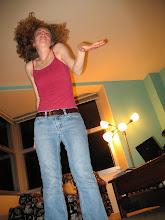I’m tickled when theatre looks at the art world.
It’s no surprise then that (after I got over my opening scene heart attack) I enjoyed “Restoration” at
New York Theatre Workshop on Friday.
As a prelude to my heart attack: the play is about an art conservator who has fallen out of favor with the “establishment”. Forced to the sidelines of the conservation field, Giulia practices in a garage in Brooklyn and teaches at the maligned Brooklyn College. She labors in near obscurity, but due to her commitment to research and the support of a persuasive old mentor, she is given the career-changing opportunity to clean Michaelangelo’s David in honor of his 500th birthday.
So, my chest clutching: Let’s not ignore the fact that Giulia works in what looks like a space without temperature control. When Giulia was done doing work for the day, she pulled down her large magnifying glass until it was only 6 inches above the painting. UGH. AGH. No conservator worth her salt leaves any sort of instrument hanging over a painting. Conservators envision disaster. They know that a magnifying glass could topple over a painting at any instance. Until the scene ended I squirmed in my seat and wondered if this was a first indication of lazy research during the play’s conception.

Happily, things swiftly improved, including the lead actress’s performance. The playwright, Claudia Shear, plays Giulia, a brash, whip smart, Italian-American art conservator. The first scene opens with Giulia alone in her studio addressing the audience as she explains how was she drawn to the field. It’s not a badly written monologue, but Shear is not a subtle actress and she has not written her character in a nuanced way. The play might have been better served by an actress who did not know the character intimately, was not her creator, and who needed to find ways to connect to her. To be fair, the character does go through a transformation and Shear does do a fine job of portraying that arc. She is softened during her time working on the David and by the joshing friendship she forms with Max, the macho, yet sensitively cultured head guard at the museum (played by the excellent Jonathan Cake). She learns that no woman is an island and only statues can stand apart from humanity forever.
Still, despite my above quibbles there is something oddly charismatic about Giulia. She cares about him vengefully and idealistically. She recognizes that this is her opportunity to blow raspberries at the academic conservation world that rejected her (something about a confusing slander case involving another conservator), but she also cares deeply about cleaning the David well and ensuring his survival for future generations. There is a moving scene at a press conference, where the director and PR manager try and coerce her into reading a press release about repairing the holes in the David’s back. Giulia deviates from the script to forcefully and eloquently defend the importance of preserving a piece of art’s history—in this case the holes from the stones thrown at the David as he was carted to the Palazzo del Signoria.
The audience never actually sees those holes, nor do they see the entire David until the end of the play. For most of the play, the statue is hidden behind scaffolding with only an assortment of visible body parts. The set designer, Scott Pask, plays with scale so that a foot is uncomfortably close to the tushy. The sculpture’s penis is at chest level and prominently displayed, leading to the compulsory awkward (well, the playwright couldn’t not go there) and hilarious cleaning session.
There are a lot of wonderfully funny moments in the play, tempered by poignant moments where the characters reflect on the David’s role in their lives and art in general. The audience members are the beneficiaries of their considered and heartfelt insights. It’s a play worth seeing and it’s a play worth mounting again, now that New York Theatre Workshop has given it its first legs.
Photo Courtesy of www.sdnn.com. Ticket courtesy of Annette.



I don't think I could watch this without having a series of little conservation-related heart attacks. I think I would have a hard time pulling myself out of what I do everyday to enjoy it.
ReplyDeleteFun fact about those magnifying glasses: you have to be especially careful if your lab has windows. It can start a fire. (It happened at one of my internship locations, prior to my arrival.)